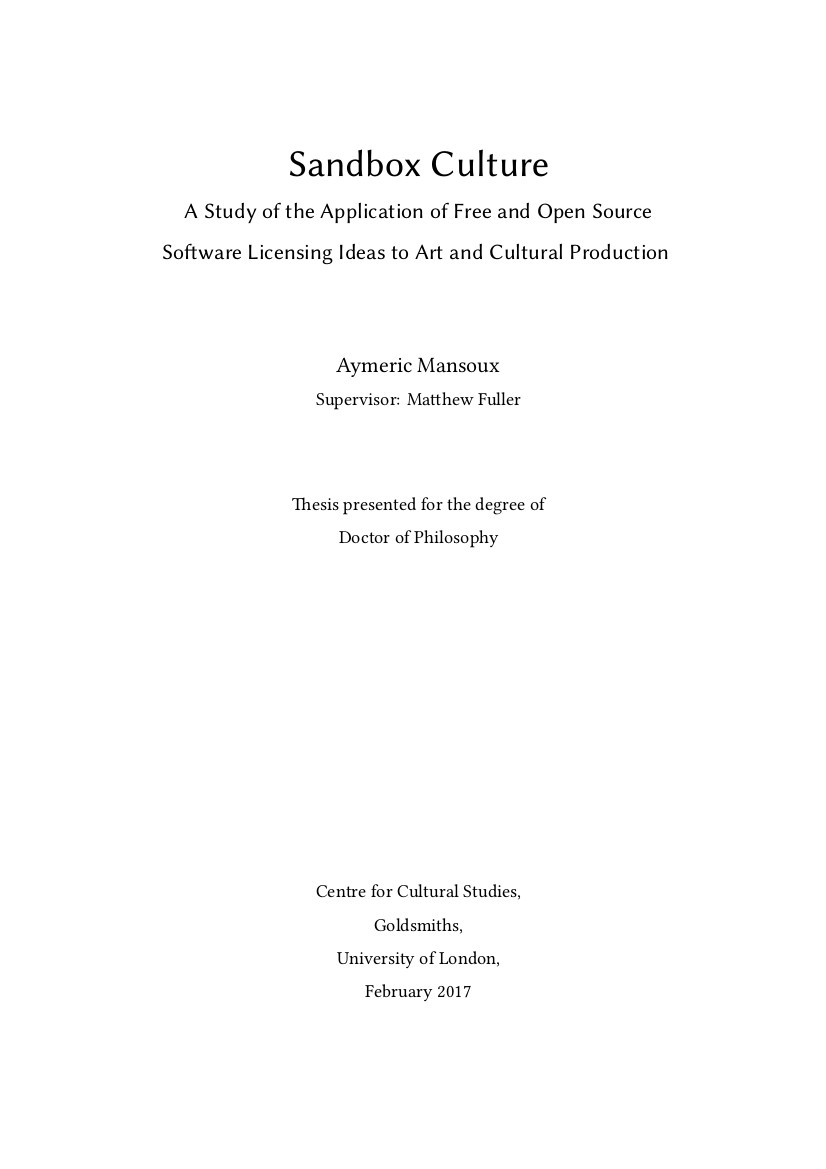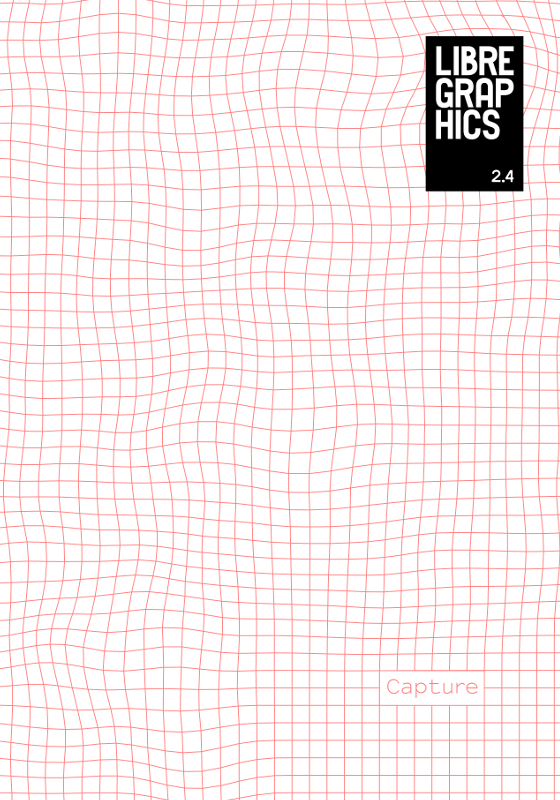Aymeric Mansoux: Sandbox Culture: A Study of the Application of Free and Open Source Software Licensing Ideas to Art and Cultural Production (2017)
Filed under thesis | Tags: · agonism, copyright, cultural production, digital culture, floss, free culture, intellectual property, law, network culture, open source, social movements

“In partial response to the inability of intellectual property laws to adapt to data-sharing over computer networks, several initiatives have proposed techno-legal alternatives to encourage the free circulation and transformation of digital works. These alternatives have shaped part of contemporary digital culture for more than three decades and are today often associated with the “free culture” movement. The different strands of this movement are essentially derived from a narrower concept of software freedom developed in the 1980s, and which is enforced within free and open source software (FLOSS) communities. This principle was the first significant effort to articulate a reusable techno-legal template to work around the limitations of intellectual property laws. It also offered a vision of network culture where community participation and sharing was structural.
From alternate tools and workflow systems, artist-run servers, network publishing experiments, open data and design lobbies, cooperative and collaborative frameworks, but also novel copyright licensing used by both non-profit organisations and for-profit corporations, the impact on cultural production of practices developed in relation to the ideas of FLOSS has been both influential and broadly applied. However, if it is true that FLOSS has indeed succeeded in becoming a theoretical and practical model for the transformation of art and culture, the question remains at which ways it has provided such a model, how it has been effectively appropriated across different groups and contexts and in what ways these overlap or differ.
Using the image of the sandbox, where code becomes a constituent device for different communities to experience varying ideologies and practices, this dissertation aims to map the consequent levels of divergence in interpreting and appropriating the free and open source techno-legal template. This thesis identifies the paradoxes, conflicts, and contradictions within free culture discourse. It explores the tensions between the wish to provide a theoretical universal definition of cultural freedom, and the disorderly reality of its practice and interpretation. However, despite the different layers of cultural diffusion, appropriation, misunderstanding and miscommunication that together form the fabric of free culture, this dissertation argues that, even though feared, fought, and criticised, these issues are not signs of dysfunctionality but are instead the evidence of cultural diversity within free culture. This dissertation will also demonstrate that conflicts between and within these sandboxes create a democratic process that permits the constant transformation of the free and open source discourse, and is therefore something that should be embraced and neither resisted nor substituted for a universal approach to cultural production.”
Includes an anthology of proto-free culture licenses, 1998-2002 (pp 382-452).
PhD Dissertation
Supervisor: Matthew Fuller
Publisher Centre of Cultural Studies, Goldsmiths, University of London, 2017
xxxviii+486 pages
via author
Libre Graphics Magazine 2(4): Capture (2015)
Filed under magazine | Tags: · design, floss, free culture, free software, graphic design, libre graphics, software

“This issue looks at Capture, the act of encompassing, emulating and encapsulating difficult things, subtle qualities. Through a set of articles we explore capture mechanisms, memory, archiving and preservation of volatile digital information, physicality and aesthetization of data.”
With contributions by Raphäel Bastide, Antonio Roberts, Eric Schrijver, Birgit Bachler, Walter Langelaar, Stéphanie Vilayphiou, Scandinavian Institute for Computational Vandalism, Sebastian Schmieg, Kenneth Goldsmith, Robert M Ochshorn, Jessica Fenlon, Anna Carreras, Carles Domènech and Mariona Roca.
Edited by Ana Isabel Carvalho, ginger coons and Ricardo Lafuente
Publisher ginger coons, Dec 2015
Creative Commons Attribution-Share Alike license
ISSN 1925-1416
50 pages
PDF (low res, 25 MB)
PDF (hi-res, 140 MB)
Source files
Libre Graphics magazine 2(2): Gendering F/LOSS (2014)
Filed under magazine | Tags: · floss, free culture, free software, gender, graphic design, libre graphics, software

The current issue of Libre Graphics engages with discussions around representation and gendered work in Free/Libre Open Source Software and Free Culture.
Why Gendering F/LOSS? In the world of F/LOSS, and in the larger world of technology, debate rages over the under-representation of women and the frat house attitude occasionally adopted by developers. The conventional family lives of female tech executives are held up as positive examples of progress in the battle for gender equity. Conversely, pop-cultural representations of male developers are evolving, from socially awkward, pocket-protectored nerds to cosmopolitan geek chic. Both images mask the diversity of styles and gender presentations found in the world of F/LOSS and the larger tech ecology. Those images also mask important discussions about bigger issues: is it okay to construct such a strict dichotomy between “man” and “woman” as concepts; how much is our work still divided along traditional gender lines; is it actually enough to get more women involved in F/LOSS generally, or do we need to push for specific kinds of involvement; do we stop at women, or do we push for a more inclusive understanding of representation?
This issue looks at some of the thornier aspects of gender in F/LOSS art and design. In discussing gendered work, the push for greater and greater inclusion in our communities, and representations of gender in our artistic practices, among others, we hope to add and amplify voices in the discussion.
Edited by Ana Isabel Carvalho, ginger coons and Ricardo Lafuente
Publisher ginger coons, January 2014
Creative Commons Attribution-Share Alike license
ISSN 1925-1416
56 pages
PDF (31 MB, low-res version for screen)
PDF (360 MB, high-res version for print)

